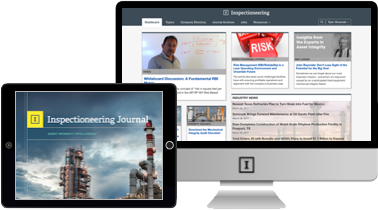Introduction
Right now, as you are reading this article, more than likely you have two or more pieces of technology in front of you. Whether they are your smart phone, laptop, Ipad or GPS in your car, we all use technology daily to help run our lives more efficiently. We use it to schedule meetings, remember important dates, keep in touch with distant friends, and to make sure our jobs are performed to the highest standards. Why is it then, that with all the technology available on the market today, so many industries still perform processes the “old fashion way?” Why do companies still have data (data that is vital to the safety or proper functioning of a piece of equipment) manually entered into their computer systems? I think most would agree, it’s time for more companies in our industry to embrace new technology by modernizing the way their data is collected.
Nobody is perfect and no one person is alike. Every separate individual who handles your data decreases the consistency and accuracy of the information. The personality of the person collecting your data can also influence the results. Decision making is determined by many forces working in the brain simultaneously that will ultimately decide the outcome. Personality traits combine with values, needs, and motivation, which ultimately combine to determine what decisions you make throughout the day. Your personality will decide whether you approach decisions rationally, emotionally, impulsively, cautiously, spontaneously, or deliberately. If a person is more outgoing and adventurous, he or she may be more impulsive in decision making versus a more analytic person who must weigh all the issues involved before reaching a decision. In spite of the amount of logic you put into your decision-making process, it is inevitable that your personality will always affect what you decide. Combined with maturity and experience, individual personality is the underlying factor. It’s very simple, the more people who interact with your data, the less accurate it becomes.
The current process of data collection for many in the Oil & Gas industry has become rather archaic, relative to other industries. The simple spreadsheet process (manual or electronic) does not allow the owner the single most important aspect of the process -- the timeliness of the data. For too long, there has been a delay between when the data is collected and when it is reported. The power to make decisions with real-time accurate data is one of the most important benefits that technology can provide. Any data or potential risk can be immediately reported and addressed as soon as the inspection data is uploaded in the facilities’ operating system. Too often this vital data sits on a desk or in a file cabinet waiting to be entered manually. It could be days, if not weeks, before any of the data is put in front of the owner to notify of any critical issues. With the severity of the potential risks that inspection data is designed to provide, why would anyone continue to take the risks by letting time pass and not implement a new technology to streamline the process?

















Comments and Discussion
Add a Comment
Please log in or register to participate in comments and discussions.